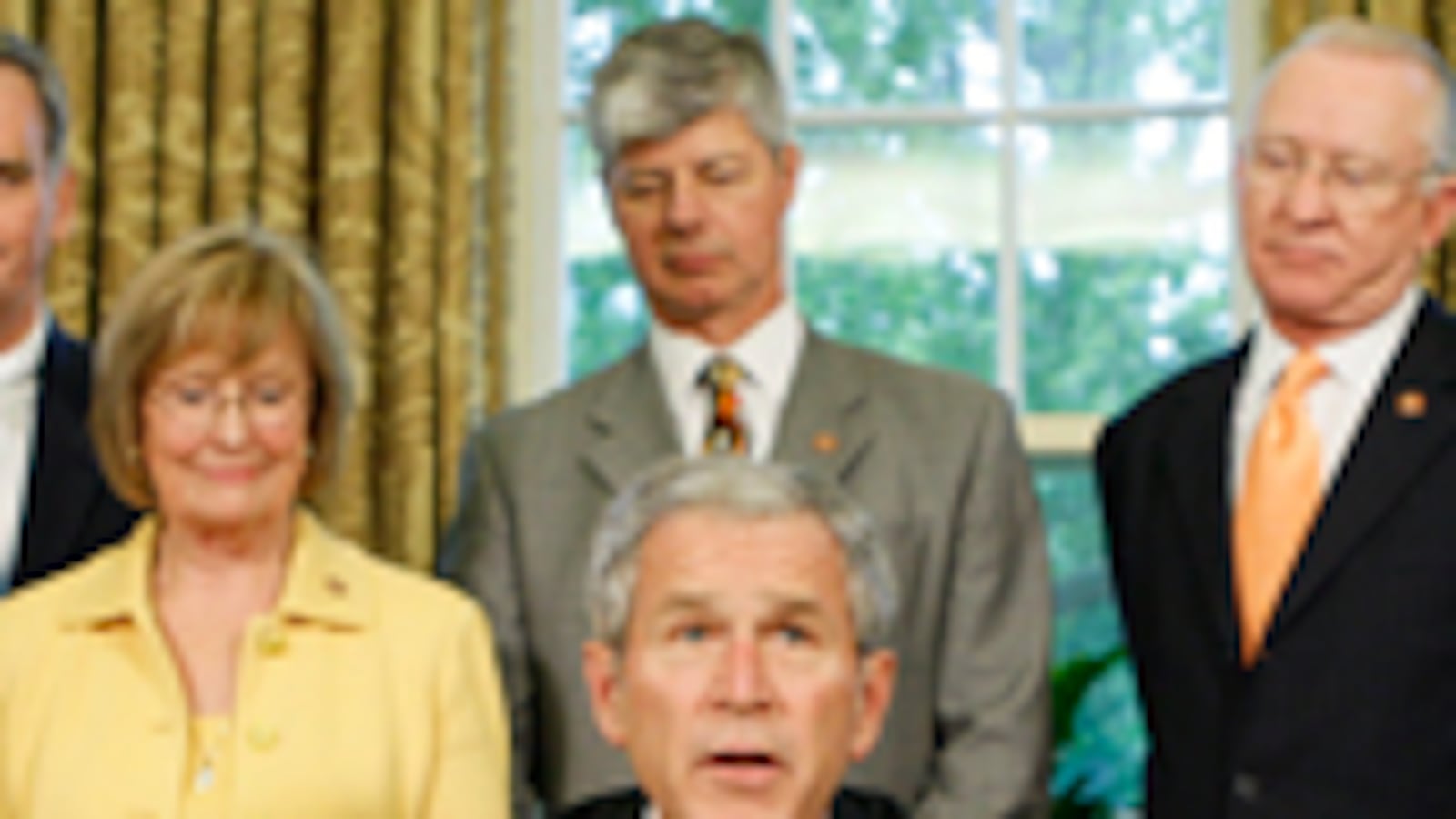
Faced with festering political controversies, frustration within the ranks, an ongoing war in Afghanistan, and a stubbornly stagnant economy, the Obama administration has no other choice. The team that once promised to rid us of old-style politics is clinging to that well-worn Washington tactic: Blame the other guy. "The other guy" is about to re-enter the fray—and the timing is making many Republicans nervous.
One prominent conservative compared the Bushies' public-relations savvy to LeBron James.
Just as their once-comatose party shows some color in its cheeks again, its old doctors are back in the ward. Former President George W. Bush and his corral of Texas-based surrogates are preparing to flood the airwaves in anticipation of his new memoir, another step in a carefully crafted rehabilitation strategy. The publication date of Bush's Decision Points is set for early November, one week after the congressional elections. But, as with any likely bestseller, the details of the book are certain to leak out earlier—meaning the Bush years could be re-litigated and re-explored during the final, pivotal weeks of the campaign.
It is not clear just how much the Bush book will affect the debate—it was Bill Clinton, after all, who said all elections are about the future. And some Republicans, particularly those most closely tied to the Bush regime, actually argue the book could help the party by reminding some voters of what they liked about Bush. Still, that has not stopped some Republicans, traumatized over the last two election cycles, from fearing the worst. "Monumentally bad timing" was the reaction of one former Bush aide who learned of the book release date. Another prominent conservative compared the Bushies' public-relations savvy to LeBron James. "Selfish and stupid" was another noted right-wing columnist's reaction. Democrats, meanwhile, are gleeful.
Thanks in large part to the Obama administration's stumbles—an unpopular health-care bill and the administration's perceived mishandling of the economy and the BP catastrophe—the Republicans are on a winning streak. But the GOP grassroots has been at work as well, trying hard to move the party away from their old leadership. Just this year, Republican voters tossed aside once-popular Washington incumbents from Senator Kay Bailey Hutchison (clobbered in the Texas gubernatorial primary) to Utah's three-term Senator Robert Bennett. They rejected Mitch McConnell's favored candidate for an open Senate seat in Kentucky (in favor of the untested Rand Paul) and forced Florida's GOP Governor Charlie Crist out of a Senate primary race he was certain to lose. Even the party's most recent presidential nominee, John McCain, is facing a stubborn primary challenge in Arizona. GOP Chairman Michael Steele, who meets with the grassroots constantly, figured out their mood early, blasting the Bush administration and Republican leadership for having "screwed up" and saying it was time to move on.
Like the Bush team itself, there is nothing that the Obama administration would like more than to re-lasso the GOP to the Bush years and, the Obama White House hopes, remind the country of why they turned to the Democrats in the first place. President Obama's consistent attacks on the Bush record undoubtedly have come as an unhappy surprise to Bush, who vowed never to criticize his successor publicly and, perhaps somewhat naively, believed Obama would return the favor. But that, of course, is not how Washington works. Starting from the first lines of his inaugural address, when Obama offended Bushies by seeming to chastise the outgoing president, Obama has made clear that he has no compunction about tarring the Bush record. And as their political fate sinks faster than Tom Cruise's latest movie, Team Obama has blamed everything on the Bush Republicans but Amelia Earhart's disappearance. (That comes next week.)
Just this month, for example, the president called the lingering recession the Bushies' fault, the result, Obama said, of "a decade of economic policies that culminated in the worst crisis since the Great Depression." On Afghanistan, the White House blamed the Bush administration for "undersourcing" and neglecting the war. And on everything from health care to energy, Obama recently blasted the Bush years for having a policy that he labeled "you're on your own"—policies that he said were "bad" for workers, "bad" for business owners, and "bad for the country." Some pundits are dubious of such a strategy, but there are a few signs that it may be working. Though Bush has been out of office for nearly two years, a recent Bloomberg poll found that more voters blamed the former president than the current one for the situation in Afghanistan, unemployment, and the federal deficit. Into this sour mood, the Bushies are preparing to wade.
The former president, who I knew to be an often "misunderestimated" politician, may indeed think his book will help his party—by setting the record straight. (There are parts of that record that can use some plain old Texas clarifyin'.) Undoubtedly some people will look more kindly on the Bush years now than they did at the time, particularly on national security. But the problem is that Bush himself will not be able to make his case before the elections. As with most high-profile books, W. will likely be embargoed from talking until his book is released—far too late to change the minds of any voters.
In the meantime, if the Obama administration has their way in the media, the weeks before the election could be about revisiting issues the party still has nightmares about: Why didn't we find WMD in Iraq? Did the Bush administration drop the ball on Afghanistan? What did the administration do to stave off the collapse of our economy? Was Alan Greenspan right that the Bush-led Republicans "deserved to lose"? Not to mention Katrina and "Heckuva job, Brownie" and prisoner-abuse scandals and on and on—discussed by the same cast of characters from Rove to Perino to Gillespie who presided when Nancy Pelosi, Harry Reid, and Barack Obama came to power in the first place.
How soon will it be before Rahm Emanuel and James Carville circulate excerpts of Decision Points to major media outlets to get that conversation started? Maybe they'll even co-host the former president's book party.
When I worked for Bush during the 2008 presidential race, the McCain campaign took pains to separate their candidate from the unpopular incumbent. This led to many awkward moments—such as McCain's noting that Bush's "busy schedule" might have to keep him from the campaign trail or the obvious thrill that the McCain team felt when a hurricane prevented Bush from speaking to the GOP convention in person. As someone who supported the president at the time, I found such treatment insulting. But Bush, to his credit, understood how controversial he had become and did not want to do anything to distract the voters from the choice before them. As he prepares to return to the spotlight, one hopes he is making that same calculation again.
Plus: Check out Book Beast for more news on hot titles and authors and excerpts from the latest books.
Matt Latimer is the author of the New York Times bestseller, SPEECH-LESS: Tales of a White House Survivor. He was deputy director of speechwriting for George W. Bush and chief speechwriter for Donald Rumsfeld.






